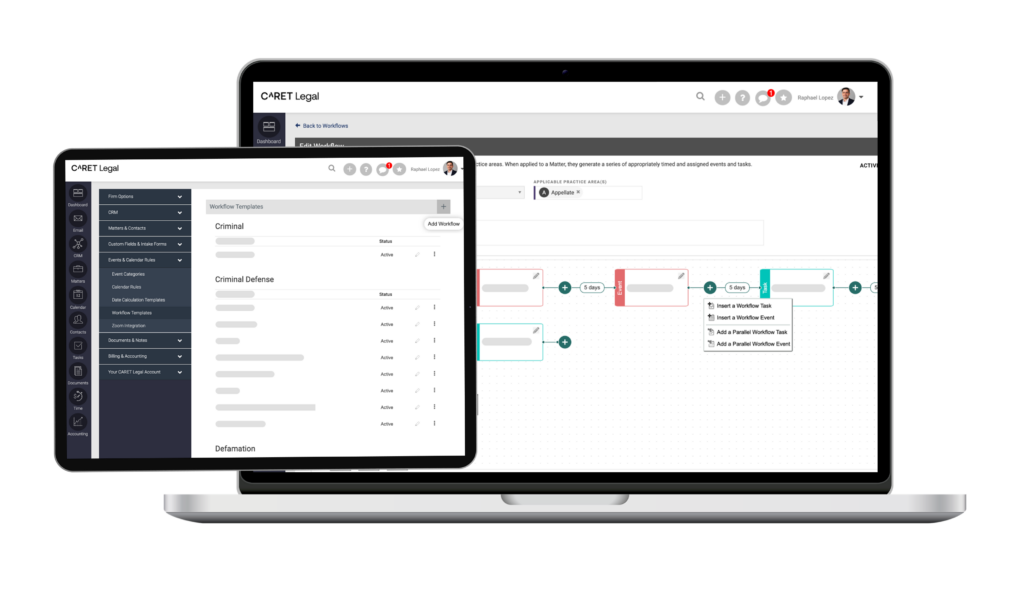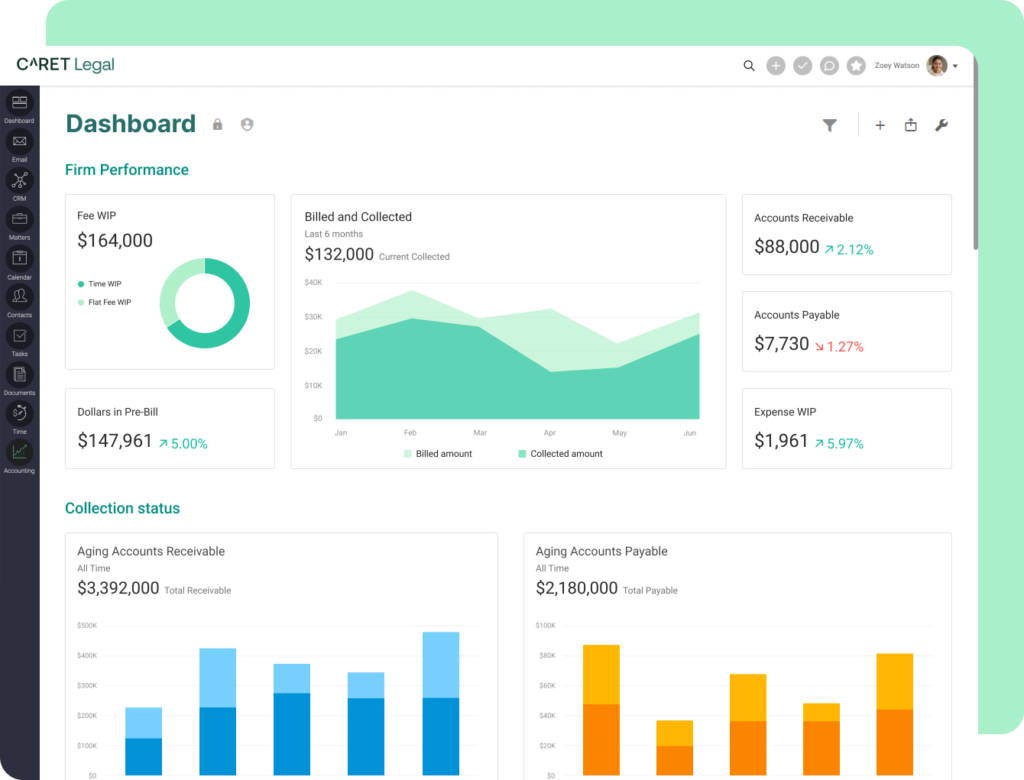According to the 2025 In-House Legal Budgeting Report from Axiom and Wakefield Research, 96% of general councils said they expect “AI will meaningfully reduce costs within their legal department.”
As we step into 2025, we’ll continue to experience technological evolution at an unprecedented pace that will reshape how law firms operate. The continuous evolution of legal technology is not just a trend; it’s a fundamental shift in how legal services are delivered, managed, and experienced. According to the 2025 In-House Legal Budgeting Report from Axiom and Wakefield Research, 96% of general councils said they expect “AI will meaningfully reduce costs within their legal department.” For law firms looking to stay ahead of the curve, embracing simplified legal tech solutions is no longer optional—it’s essential.
The importance of adopting these technologies cannot be overstated. They offer the potential to dramatically improve efficiency, reduce costs, and enhance client service. As we delve into the key areas of legal technology that are set to define 2025, it’s crucial to understand how these innovations can enhance your practice and position your firm for success in an increasingly competitive market.
AI-Powered Assistants
Artificial Intelligence (AI) and machine learning have moved from buzzwords to essential tools in the legal profession. In 2025, these technologies will revolutionize legal research, document review, and case predictions. AI-powered tools can now sift through vast amounts of legal data in a fraction of the time it would take a human, to identify relevant cases, statutes, and precedents with remarkable accuracy.
But the impact of AI goes beyond just speed. Machine learning algorithms are enabling data-driven decisions, offering predictive analytics that can forecast case outcomes, estimate settlement values, and even suggest optimal litigation strategies. This level of insight was once the domain of the most experienced attorneys, but now it’s available at the click of a button.
Perhaps most importantly, AI tools are freeing up attorneys to focus on higher-value work. By automating time-consuming tasks like initial document review or contract analysis, lawyers can dedicate more time to strategic thinking, client counseling, and complex problem-solving—the areas where human expertise truly shines.
All-in-One Practice Management
In 2025, integrated legal practice management systems will further cement their role as the cornerstone of efficient law firms. These comprehensive platforms centralize key processes, dramatically improving productivity and organization across all aspects of legal practice.
Modern all-in-one solutions currently offer a suite of essential features including:
- Case Management: Centralized dashboards provide a holistic view of case progress, deadlines, and activities, ensuring nothing falls through the cracks.
- Time and Billing: Automated time tracking and invoicing streamline financial operations, capturing billable hours accurately and improving profitability.
- Document Management: Integrated storage, retrieval, and version control systems enhance organization and collaboration while automating routine document creation.
- Client Communication: Secure client portals facilitate file sharing and payment processing, elevating client satisfaction.
- Workflow Automation: Customizable workflows automate task assignment and deadline management, ensuring consistency across different case types.

By consolidating these functions into a single platform, law firms eliminate data silos and gain a comprehensive view of their operations. This integration enables seamless information flow between different aspects of the practice, from case tracking to financial management. Attorneys can access all necessary information through one intuitive interface, reducing time spent switching between applications. This centralization minimizes the risk of errors, improves data accuracy, and allows lawyers to focus more on high-value tasks like client counseling and case strategy.
Moreover, these all-in-one solutions offer scalability, growing with the firm and adapting to changing needs. By integrating these features and more into a single platform, CARET Legal offers a holistic solution that eliminates data silos and provides a comprehensive view of firm operations. From case tracking to financial management, everything is accessible through one intuitive interface, enabling law firms to operate with unprecedented efficiency in the digital age.
Automated Productivity
There’s no denying that automation will become a game-changer for law firms, simplifying repetitive tasks and dramatically boosting productivity. Tasks that once consumed hours of valuable time will be completed in minutes, allowing legal professionals to focus on complex, high-value work.
Automation is revolutionizing key areas of legal practice:
- Document Generation: Smart systems now draft contracts and legal documents by pulling from extensive clause libraries and templates, reducing the time spent on repetitive drafting tasks.
- Billing: Automated time-tracking and invoice generation ensure accurate, timely billing, minimizing revenue leakage and improving cash flow.
- Client Intake: Digital intake forms and automated conflict checks simplify the onboarding process, enhancing efficiency and client experience.
The benefits of automation extend beyond mere time-saving. By reducing manual data entry and repetitive tasks, automation significantly decreases the risk of human error, improving overall accuracy and quality of work.
Examples of tasks now being automated by legal software include:
- Automated reminders for court dates, filing deadlines, and client follow-ups
- Intelligent contract drafting that adapts to specific client needs
- Streamlined invoicing that automatically tracks billable hours and generates detailed bills
As firms embrace these automated solutions, they’re seeing substantial improvements in efficiency, accuracy, and client satisfaction. However, it’s crucial to note that automation complements rather than replaces legal expertise, freeing up lawyers to focus on strategic thinking and complex problem-solving – areas where human insight remains invaluable
Tasks that once consumed hours of valuable time will be completed in minutes, allowing legal professionals to focus on complex, high-value work.
Enhanced Cybersecurity Measures
Law firms continue to transform from mere custodians of sensitive client information to guardians of digital assets requiring the highest levels of protection. This evolution has brought about several key developments:
- Advanced Encryption: End-to-end encryption now safeguards all client communications and data storage, rendering intercepted data indecipherable to unauthorized parties. This level of protection ensures that sensitive client information remains confidential, even if intercepted during transmission or storage.
- Intelligent Cloud Security: Cloud solutions have evolved beyond storage, employing advanced threat detection and prevention capabilities to actively monitor and neutralize potential security breaches in real-time. This proactive approach to security helps firms stay ahead of emerging cyber threats.
The authentication landscape has also undergone significant changes. Multi-factor Authentication (MFA) is now ubiquitous, often incorporating biometric verification. Constant vigilance has become the norm, with regular security audits and penetration testing as routine as client meetings. Employee training on cybersecurity best practices is now an ongoing, dynamic process, ensuring that the human firewall is as robust as the digital one.
Smart Data Analytics
Data analytics has emerged as the secret weapon of successful law firms for 2025, revolutionizing various aspects of legal practice:
- Case Strategy and Resource Allocation: Predictive analytics forecast the likelihood of success for different legal approaches and identify the most profitable case types. This data-driven approach allows firms to make informed decisions about which cases to take on and how to allocate resources most effectively.
- Client Retention and Financial Management: Firms can proactively address issues by analyzing client behavior patterns, while advanced models forecast cash flow and suggest optimal pricing strategies. This helps firms maintain strong client relationships and ensure financial stability.
- Performance Measurement and Improvement: Real-time dashboards provide instant insights into attorney productivity, case progression, and overall firm efficiency. This transparency fosters a culture of continuous improvement and allows for timely interventions when issues arise.
- Trend Identification and Strategic Planning: Firms can identify emerging legal trends and potential new practice areas by aggregating and analyzing public legal data. This forward-looking approach allows firms to stay ahead of the curve and adapt their services to meet evolving client needs.
As we move further into 2025, the firms that fully embrace and effectively utilize advanced analytical tools are setting themselves apart in an increasingly competitive legal landscape. They’re not just reacting to changes; they’re anticipating them, using data to drive innovation and excellence in every aspect of their practice.

Bringing It All Together
The most successful law firms of 2025 will create seamless, integrated tech ecosystems. This integration manifests in several ways:
- Unified Platforms: Comprehensive practice management systems offer a wide range of integrated features, from case management to billing to client communication.
- API-Driven Integration: For firms using specialized tools, robust APIs allow for seamless data flow between different systems.
The shift to cloud-based tools has facilitated easier integration and real-time data syncing across platforms. AI-powered workflow automation has taken this a step further, with intelligent systems creating workflows that span multiple tools, automating complex processes.
The benefits of this integration are numerous. Data silos have been eliminated, with all parts of the firm working from the same, up-to-date information. The risk of errors from manual data transfer has been minimized, and decision-making is now based on a unified view of firm operations.
As law firms look to the future, this level of integration and interoperability will undoubtedly be a key factor in determining their success in an increasingly competitive and technology-driven legal landscape.
Embracing the Future of Legal Technology
As we navigate the legal technology landscape of 2025, it’s clear that the focus is on automation, AI, enhanced cybersecurity, and data-driven insights to simplify law firm operations. These advancements are not just changing how legal work is done; they’re transforming the very nature of legal service delivery.
For law firms looking to stay competitive and efficient in this new era, embracing simplified legal tech solutions is crucial. By leveraging these technologies, firms can enhance their service delivery, improve client satisfaction, and position themselves for sustained success in an increasingly digital legal world.
The future of legal practice is here, and it’s powered by technology. As you consider how to advance and simplify your firm’s legal technology in 2025, explore comprehensive solutions that can support your journey toward a more efficient and effective practice.
Take the first step today by scheduling a demo with CARET Legal and discover how our all-in-one platform can transform your firm for the future!
